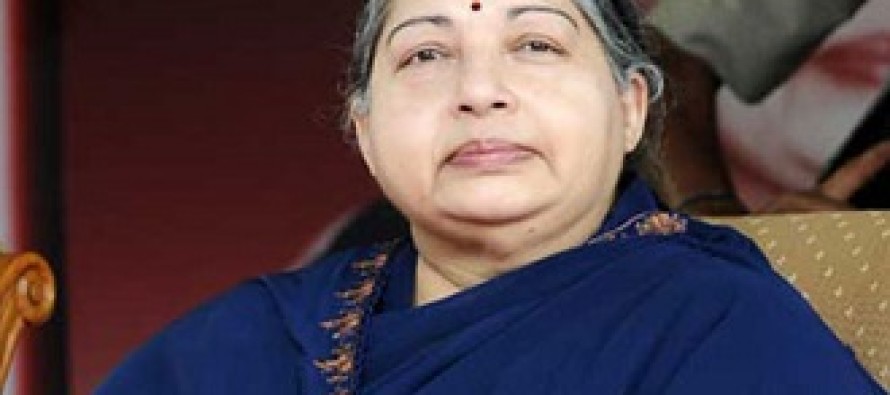Long arm of law finally reaches Indian powerful politician

Corruption undermines the state institutions, norms of democracy, ethical values, justice, and the rule of law. Corruption has become a major issue in political and economic significance in recent years in developing countries. Further the links between corruption and other forms of crime exist, in particular organized crime and economic crime, including money-laundering. Corruption hurts people directly or indirectly.
On 27th September, a Bangalore Court dealt a fatal blow to the political career of All India Anna Dravida Munnetra Kazhagam (AIADMK) supremo and 66- year old Tamil Nadu Chief Minister Jayaram Jayalalitha. She is popularly known as “Amma” among her supporters..
The Court sentenced her to four years in jail and also slapped a fine of Rs 100 crore on her in a disproportionate assets case under the Prevention of Corruption Act. She cannot contest elections for the next 10 years as she has been barred from trying her electoral fortune for six years after the end of her jail term.
With the conviction and sentencing in the case, Jayalalithaa has also been disqualified as an elected representative and ceases to be a member of the Tamil Nadu Legislative Assembly. She has been arrested and lodged in Bangalore Central Jail.
In India that has long tolerated brazen corruption, her conviction will stand as a benchmark. While Jayalalitha waits in jail she has challenged her conviction and applied for bail. The Bangalore high court rejected her bail application on 7 October, although the prosecutors agreed on conditional bail. Now the petition of bail will go to the Supreme Court.
A former film actress, Jayalalitha is one of India’s most colourful and controversial politicians and has a huge following in Tamil Nadu.. She was a third time chief minister and her party secured 37 legislative seats out of 39. Her supporters say that the verdict was driven by a political vendetta.
Corruption case & the Supreme Court
The case was lodged in 1996 by her former friend Subramanian, the then leader of Janata Party. He alleged that after coming into power as a poor woman, she illegally accumulated Rs. 66 crore (about $10 million) . A search of her home reportedly found that she possessed 10,000 sarees, 66 pounds of gold, and one gold waist belt studded with 2,389 diamonds, 18 emeralds, and 9 rubies weighing 2.3 pounds..
It is interesting to note that she was not tried in her state but in a neighbouring state because prosecutors claimed that her trial could be compromised in her state. The case inched its way forward through delays and a crucial turning point came in 2003 when the Supreme Court shifted the case to Karnataka state as prosecutors desired .
Appearing before the court four times, Jayalalitha has answered 1,339 questions in closed door hearings during which she has maintained that the case was “politically motivated” and “fabricated” at the instance of her rival DMK.
Despite her wealth, power and friendship with Prime Minister Modi, she has become the first sitting chief minister under a tough Supreme Court ruling that bars her from remaining in office while merely appealing a conviction as convicted persons have done for decades.
Evidence of Opulence:
The judge writes in the judgment that “heady mix of power and wealth is the bottom line of the case”. That she enriched herself in office should not come as a surprise. In 1995, during a period when she professed to earn a salary of Rs. 1 per month, she hosted an opulent wedding for her foster son that included 40,000 guests and a formal sit-down dinner for 12,800 according to court documents.
After the flamboyance at her first term, she became more careful and the public have benefitted from numerous public welfare programmes she had introduced: nutritious meals are available at a cheap price at “Amma Canteens”, medications at “Amma pharmacies”, and “Amma salt,” “Amma water” are also available
Reaction of supporters:
On 30th September, actors, directors and other members of the Tamil film industry began a day-long silent fast in the state capital, Chennai, to express “support and solidarity” for Jayalalitha. All the cinemas are shut in the city until the evening and all film shoots have been cancelled for the day.
Her imprisonment has dismayed her supporters who have held protests and wept openly. Some of them even self-immolated. It is reported that on the day the verdict was read, a 58-year old electrician walked out of the shop where he had been watching the news coverage soaked himself with gasoline and set himself on fire shouting : “ My Amma has failed in the court”.
It was hard to say how many had committed suicide over her imprisonment.. Chief Minister O Panneerselvam stepping in for former minister J Jayalalitha after her arrest in the disproportionate assets case reminds us of ‘Ramayan’ one of the India’s most popular mythological tale.
Similar to Bharat’s sacrifice, Panneerselvam and many other staunch loyalists of Jayalalithaa’s ministry broke into tears when they were given the responsibility to govern the ‘kingdom’ of Tamil Nadu in their ‘Ram’ Amma’s absence. Mythological tale: When Lord Ram’s younger brother Bharat learned of his departure, he sought Ram in the forest and reminded him that the eldest must rule. “Please come back and claim your rightful place as king.”
Her supporters reportedly said: “ Today our madam is in jail and we ask our god to help us overturn the obstacles”.
Conclusion:
Finally, the judge concluded his 1,136-page ruling with a quotation from former US Vice-President Al Gore that :If political and economic freedoms have been siblings in the history of liberty, it is incestuous coupling of wealth and power that poses the deadliest threat to democracy”. How true it is for sustaining democracy


